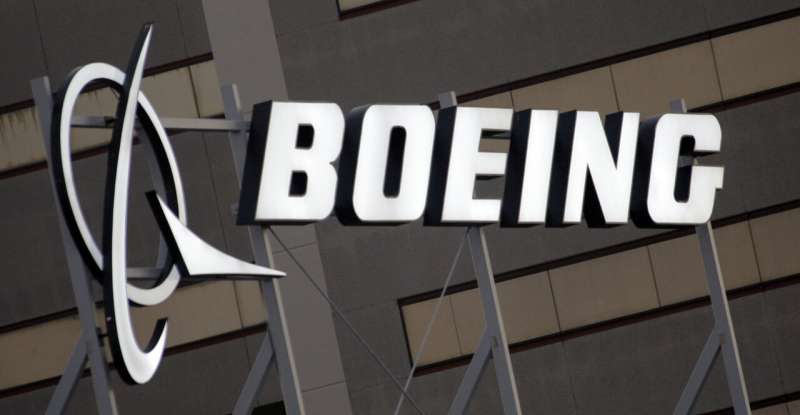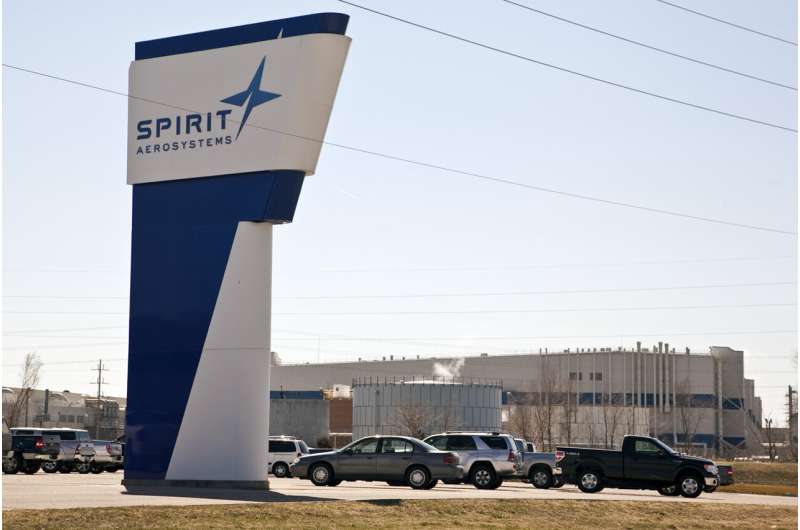Boeing announced plans to aquire Spirit AeroSystems for $4.7 billion in an all-stock transaction for the manufacturing firm, which already was part of the aerospace company’s manufacturing chain.
Boeing, located in Arlington, Virginia, announced the purchase in a statement late Sunday.
The acquisition’s equity value of $4.7 billion is $37.25 per share, while the total value of the deal is around $8.3 billion, which includes Spirit’s last reported net debt, the aerospace company said.
Boeing common stock will be exchanged for Spirit shares according to a variable formula that depends on a weighted average of the share price over a 15-trading-day period ending on the second day before the deal closes, Boeing said.
Spirit, located in Wichita, Kansas, manufactures key parts for Boeing aircraft. Spirit also announced the acquisition on its website and social media.
“We believe this deal is in the best interest of the flying public, our airline customers, the employees of Spirit and Boeing, our shareholders and the country more broadly,” Boeing President and CEO Dave Calhoun said in the statement.
Boeing previously owned Spirit and the aerospace company said bringing the supplier back into the Boeing fold would improve plane quality and safety, which has come under increasing scrutiny by regulators, Congress and airlines.

“By reintegrating Spirit, we can fully align our commercial production systems, including our Safety and Quality Management Systems, and our workforce to the same priorities, incentives and outcomes — centered on safety and quality,” Calhoun said.
The purchase of Spirit would reverse a longtime Boeing strategy of outsourcing key work on its passenger planes. That approach has been criticized as problems at Spirit disrupted production and delivery of popular Boeing jetliners including 737s and 787s.
“Bringing Spirit and Boeing together will enable greater integration of both companies’ manufacturing and engineering capabilities, including safety and quality systems,” Patrick Shanahan, Spirit president and CEO, said in a statement.
Concerns about safety came to a head after the Jan. 5 blowout of a panel on an Alaska 737 Max 9 at 16,000 feet (4,876 meters) over Oregon. The Federal Aviation Administration soon after announced increased oversight of Boeing and Spirit.
The Justice Department said in a May court filing that Boeing violated terms of a 2021 settlement allowing the company to avoid prosecution for actions leading up to two deadly crashes involving the company’s 737 Max jetliners more than five years ago.
The Justice Department is pushing Boeing to plead guilty to criminal fraud in connection with two deadly plane crashes involving its 737 Max jetliners, according to several people who heard federal prosecutors detail a proposed offer Sunday.

Boeing has until the end of the week to accept or reject the offer, which includes the giant aerospace company agreeing to an independent monitor who would oversee its compliance with anti-fraud laws, they said.
The companies also announced an agreement with Airbus to negotiate the purchase of Spirit assets involved with programs operated by the European aerospace firm. The Airbus agreement is set to commence when Boeing’s acquisition of Spirit is completed, the two U.S. companies said.
The FAA said in June it is investigating how titanium parts that were sold with falsified quality documentation were used in the construction of Boeing and Airbus passenger jets in recent years.
Boeing and Airbus, headquartered in the Netherlands, said the planes with the falsely documented parts are safe to fly, but Boeing said it would remove affected parts from planes that had not yet shipped to airline customers.
© 2024 The Associated Press. All rights reserved. This material may not be published, broadcast, rewritten or redistributed without permission.
Citation:
Boeing announces purchase of Spirit AeroSystems for $4.7 billion in stock (2024, July 1)
retrieved 1 July 2024
from https://techxplore.com/news/2024-07-boeing-spirit-aerosystems-billion-stock.html
This document is subject to copyright. Apart from any fair dealing for the purpose of private study or research, no
part may be reproduced without the written permission. The content is provided for information purposes only.

